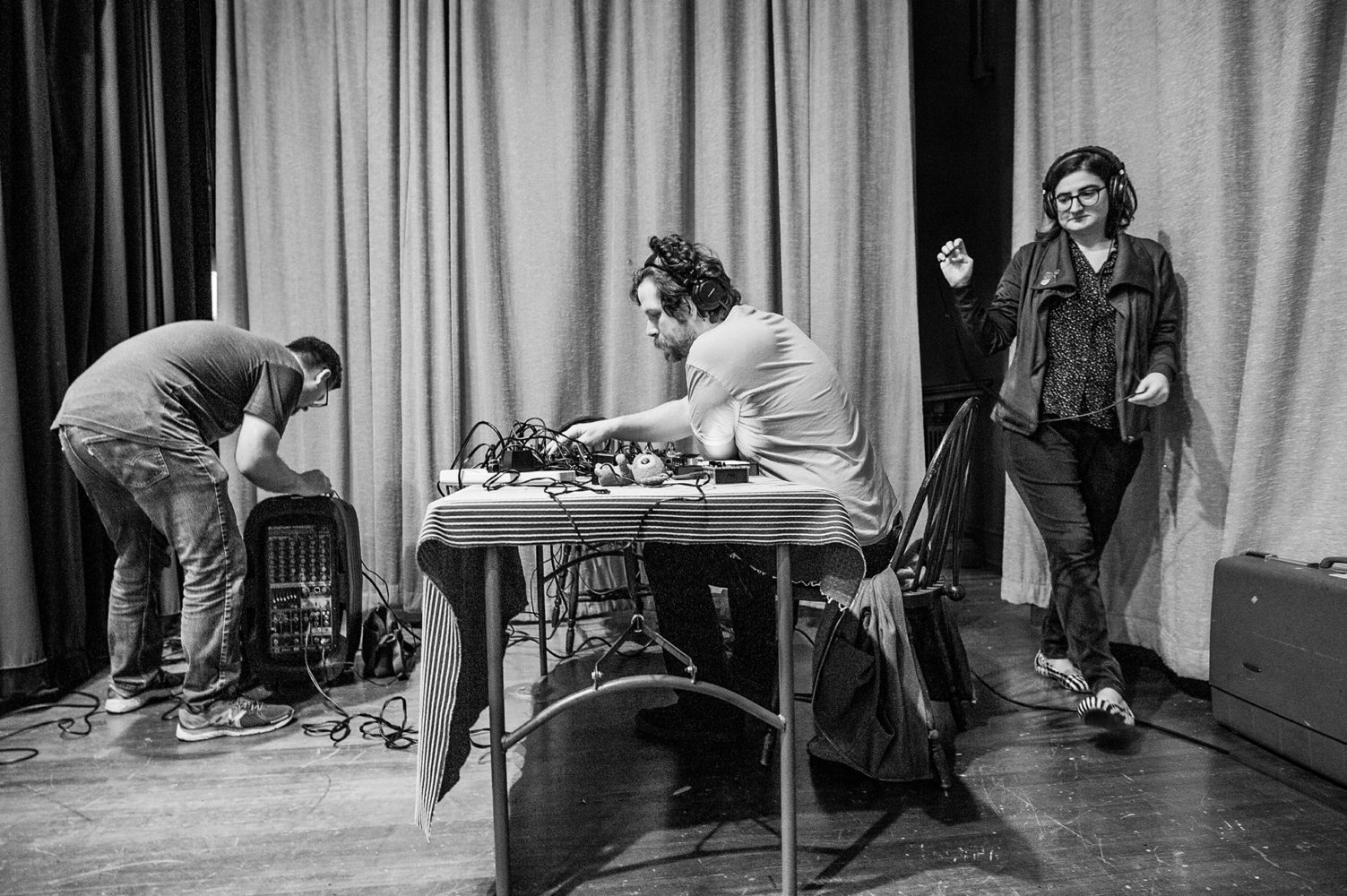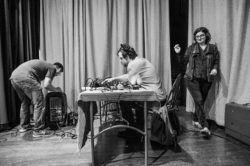Bookstand
Listen Local
Louisiana-made podcasts provide a window into the inner life of the Bayou State
Published: May 31, 2019
Last Updated: August 30, 2019

Photo by Shannon Palmer
Chris Jay, Nate Treme, and Sara Hebert prepare to record a live session of the All Y’all storytelling podcast in Shreveport.
These days, aspiring broadcasters don’t need to own a slice of the radio band to potentially be heard by millions of listeners. Anyone with access to a smartphone and an internet connection has the basic tools necessary to reach audiences around the world through podcasting. Listeners who search for “Louisiana” within any of the popular podcasting apps will find a plethora of results that conform to the perceived identity of our state—that is to say, there are lots of Louisiana-made podcasts about sports, religion, and food, as well as topics outside these favorite local topics.
Many of these are highly-polished, National Public Radio–style productions that began life as radio programs. Louisiana Eats!, a food-and-drink show hosted by Poppy Tooker and produced in New Orleans, is a great example. Tooker secures big-name guests from the culinary world for her weekly show, which has recurring segments and high production values. Tooker, who launched Louisiana Eats! in 2010, said that streaming her show as a podcast has helped her develop a worldwide audience. She’s been contacted by listeners in Russia, Japan, Australia, and Switzerland, among other countries. “We have such a devoted podcast audience that, last year, we decided to reward our listeners with standalone, podcast-exclusive episodes called ‘Quick Bites,’” Tooker said. “I love the podcast medium because it’s permanent, where radio is ephemeral. People in the future will be able to do research using this archive that we’ve created over the last nine years.”
On the other end of the spectrum from podcasts like Sticky Wicket and Louisiana Eats!, there are a surprisingly large number of lo-fi, do-it-yourself podcasts being produced in Louisiana, many of which have been bootstrapped by individuals with little or no training in audio production. Louisiana Eat-n-Greet, hosted and produced by Rodney Mallet and Chris Melton, is an unfiltered (and largely unedited) travelogue that follows two Baton Rouge dads as they visit popular Louisiana eateries. The joy of podcasts like Louisiana Eat-n-Greet lies in the fact that they are, for lack of a better term, amateurish. Listeners join Mallet and Melton in their garage recording studio as they discuss recent meals at restaurants like Darrell’s in Lake Charles and Fat Daddy’s in Plaquemine. The conversation rarely remains centered around food for long, if it can be said to center on any topic at all. Louisiana Eat-n-Greet is what would happen if the male characters from the animated television series King of the Hill took over as hosts of Guy Fieri’s Diners, Drive-Ins and Dives.
The Ruston-based Louisiana Anthology Podcast, which has published nearly three hundred episodes since launching in 2012, makes up for what it lacks in production values with an incredible knack for tracking down and interviewing some of the most fascinating people in Louisiana. The podcast’s two-part interview with Dolph Williams, whose mother, Hazel, invented the Louisiana-style frozen daiquiri, is a must-listen for anyone who is interested in Louisiana food and drink history. New episodes published each Saturday highlight the lives and work of Louisiana activists, artists, organizers, and entrepreneurs. Because the podcast is a project of Louisiana Tech professors Dr. Bruce R. Magee and Stephen Payne, each episode is accompanied by various citations, footnotes, and teaching aids.
There are also several noteworthy podcasts dedicated to agriculture and the environment in Louisiana. Though these podcasts are clearly produced for the benefit of farmers and other agriculture industry insiders, they can make for compelling listening. On a recent episode of The Voice of Louisiana Agriculture, Governor John Bel Edwards recounted his conversations with President Donald Trump regarding China’s tariffs on American soybeans and how those tariffs are expected to impact Louisiana growers. The Voice of Louisiana Agriculture has radio roots dating back to 1976 and still airs as a radio broadcast on forty-nine stations throughout Louisiana and Mississippi.
Delta Dispatches, a weekly podcast produced by the nonprofit Restore the Mississippi River Delta, exists to track the progress of the 2017 Coastal Master Plan put forth by the Coastal Protection and Restoration Authority. By interviewing restaurateurs, fishing guides, and wildlife photographers in addition to climate scientists, Delta Dispatches provides a 360-degree perspective on the challenges of coastal erosion.
Other Louisiana-made podcasts simply offer a window into the lives of Louisianans past and present. All Y’all is a Shreveport-based live storytelling event series and podcast similar to the nationally syndicated public radio program The Moth. All Y’all follows in the footsteps of New Orleans’ Bring Your Own, a “a nomadic storytelling series that takes place in unconventional spaces within the community” and releases select stories as podcast episodes.
Some of the most compelling podcasts currently being produced in Louisiana are those that provide an outlet for the voices of marginalized communities. Last Call: Queer Histories/Queer Futures, currently preparing to launch its second season of new episodes, is an oral history of New Orleans’ disappearing lesbian bar scene. In its fusion of the glossy production values of public radio and the raw, emotional impact of person-to-person storytelling, Last Call comes off as a longform episode of This American Life dedicated to exploring the consequences of what one interviewee calls “the mainstreaming of gay culture” in New Orleans. VietNOLA documents life within New Orleans’s sizable Vietnamese community. Host Kim Vu is a skilled interviewer who doesn’t shy away from difficult topics. A 2015 episode featuring Dr. Eric Tang, Director of the Center for Asian American Studies at the University of Texas at Austin, examines the relationship between Asian American and African American communities in post-Katrina New Orleans—a relationship, the episode posits, that is remarkably different than the one often perceived to exist between these communities.
These examples represent only a small cross-section of Louisiana’s podcasting community. There are also podcasts about hunting and fishing, local music, Japanese animation, independent cinema, and more. In every corner of the state, people from every imaginable background are making their voices heard via this powerful new medium.
Chris Jay is a resident of Shreveport, where he and his partner, Sara Hebert, produce the podcasts All Y’all and Stuffed and Busted out of their home in the Shreve Island neighborhood. He holds a BS in professional writing from Centenary College of Louisiana and has contributed articles to Louisiana Life, Country Roads Magazine, and Louisiana Cookin’.
